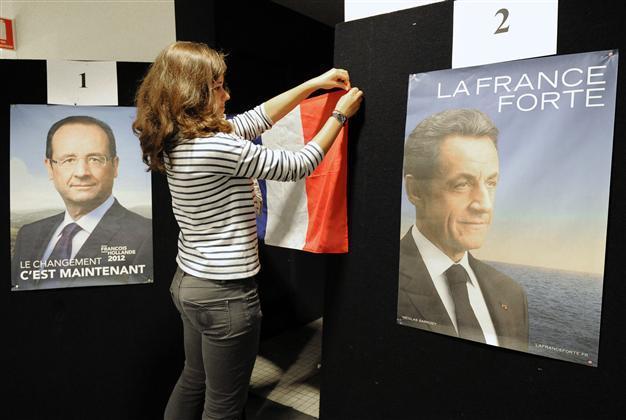Sarkozy closes on Hollande as France elects president
PARIS - Agence France-Presse

AFP Photo
French voters went to the polls Sunday to give their final verdict in the hard-fought presidential battle between right-wing incumbent Nicolas Sarkozy and his Socialist challenger Francois Hollande.Opinion polls and electioneering were banned in the final 32 hours before polling stations opened at 8:00 am (0600 GMT), but Hollande began the day as firm favourite despite signs that Sarkozy was closing the gap.
Dark grey skies and scattered rain showers greeted early voters in Paris, but turnout was expected to be high if not quite as huge as it was in 2007, when Sarkozy defeated Hollande's then partner Segolene Royal.
More than 46 million voters were eligible to take part. Polling was to close at 8:00 pm, followed immediately by initial results.
Hollande campaigned as a consensus-building moderate focused on restoring economic growth and is seen as on course to become France's first Socialist president since Francois Mitterrand died in office in 1995.
Sarkozy has trailed consistently in opinion polls for the last six months, but fought a bruising campaign focused on mobilising voters fearful that immigration and globalisation threaten the French way of life.
Final opinion polls conducted on Friday before campaigning was officially suspended for the weekend suggested the still energetic Sarkozy may have closed the gap on the frontrunner to as little as four percent.
But a complete turnaround would still constitute a surprise, and Hollande was expected to assume the leadership of France, the eurozone's second-largest economy and a nuclear-armed permanent member of the UN Security Council.
Voter turnout in the first round of voting on April 22 was high, at just under 80 percent, and the duelling run-off candidates, both aged 57, have warned their supporters not to stay at home as every vote counts.
Even before polls opened on the mainland, more than a million had voted in overseas territories and consulates in foreign cities with a large French expatriate population, with turnout slightly higher than in the first round.
Hollande was to vote in his provincial political heartland Tulle in central France, while Sarkozy was to vote in Paris' chic 16th arrondissement, near the private flat he shares with his former supermodel wife Carla Bruni-Sarkozy.
If he loses, Sarkozy will become the first French president since Valery Giscard d'Estaing in 1981 not to be re-elected. He is already the first ever incumbent not to come out ahead in the first round of voting.
France has a strict ban on publishing result estimates until all polls close, but foreign media websites are expected to publish estimates before then, and these will spread quickly via Twitter and Facebook.
Anyone breaking the law on sharing early estimates faces a fine of 75,000 euros (100,000 dollars), but French citizens got around the restriction in the first round by using code words and the Twitter hashtag #RadioLondres.
Hollande won the first round with 28.63 percent of the votes to Sarkozy's 27.18 percent, and both candidates have been fighting for the votes of those whose candidates failed to make the run-off.
Far-right anti-immigrant candidate Marine Le Pen, who won almost 18 percent in the first round, has said she will cast a blank ballot and observers expect many of her supporters to do the same.
The polling institute Ifop, however, forecasts that 55 percent of her voters would back Sarkozy and 19 percent Hollande.
Hollande needs a strong mandate to implement his programme to counter EU-driven austerity, while Sarkozy has played on fears that the election of a Socialist would send shudders through the EU and the financial markets.
Whoever wins will next have to build a parliamentary majority after June's legislative elections, but the formal handover of presidential power is expected on or around May 15 -- in any case before May 17.
The last week of the campaign was marked by a dramatic television debate that saw the contenders trade insults without either landing a knock-out blow.
Many French were surprised at the Socialist's aggression, while Sarkozy defended his record as France's protector during a global economic crisis.
Fears over low economic growth, rising joblessness and European Union-imposed austerity measures have worked in favour of the Socialists.
Many voters also disapprove of Sarkozy's flashy style during his five-year term, welcoming Hollande's promise to be a "normal president."
















